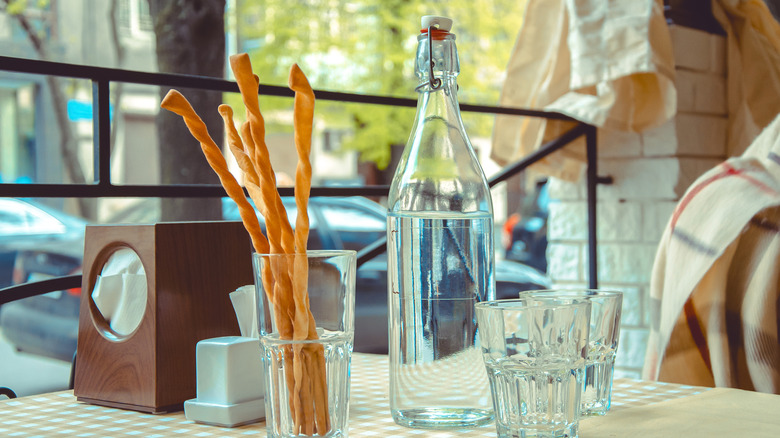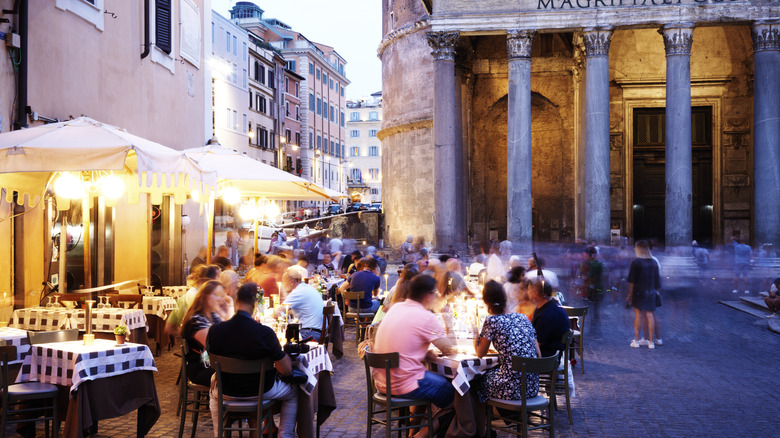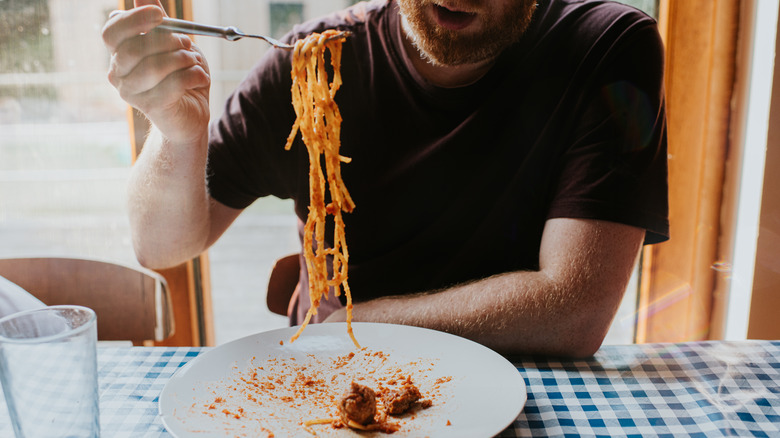Ignoring This Italian Restaurant Etiquette Rule Could Leave You With A Lecture
We live in a fast-paced world, and some people think lunch breaks are for wimps. A 2024 study revealed that around three-quarters of corporate workers in the United States cram in lunch at their desks in less than the allotted time. Moreover, 68% of respondents who eat a desk lunch said they prefer it that way. If you come from this kind of hustle culture where food is merely a resource to help maintain productivity, it can take time to unwind when you finally take a vacation, especially in a country like Italy. For millions of Italians, dining is one of life's great pleasures: a time for relaxing, good conversation, and great food. Yet even in such a laid-back environment where meals can (and should) last for hours, one rule of etiquette may provoke a stressful response: ordering tap water with your dinner.
Italian cuisine is justly regarded as some of the finest on the planet, and sampling it in one of the best authentic restaurants is a highlight of any trip to Europe. Across Italy, an evening meal is a cherished nightly event that starts with a pre-dinner aperitivo, lingers until the last drop of sauce is mopped up, and ends with a digestif slowly savored. In general, eating out in Italy is a leisurely affair (unless you're dining in a tourist trap restaurant), but there are some do's and don'ts, and asking for tap water is definitely one of them.
What is the problem with ordering tap water in Italy?
Some travelers get a bit nervous about drinking tap water in other countries, which may be justifiable in some parts of the world. In Italy, however, the water supply is regulated by the government to ensure the highest safety and quality standards. It's okay to quench your thirst at drinking fountains in big cities if you don't mind the communal aspect. Some places pose more of a risk, such as isolated rural communities where the water may be drawn from a private well. Overall, you shouldn't have a problem.
While safety isn't an issue, many Italians prefer bottled water, even at home. It usually boils down to the fact that they like the taste better than tap water, which can be affected by factors such as aging pipes. They often carry that preference over to dining in a restaurant, and Italians will routinely order a bottle for the table, either still (naturale) or sparkling (frizzante). It doesn't add much to the bill in the grand scheme of things, and it will keep your server happy. Indeed, asking for tap water can cause offense, and more gregarious waiters may give a short lesson about how tap water is detrimental to the enjoyment of your food. Nevertheless, it is unlikely that your request for tap water will be refused, although you might find that your glass or carafe is only begrudgingly topped up — if at all.
Other do's and don'ts in Italian restaurants
Dining is an important part of Italian culture, and there are a few other rules of etiquette you should observe. Italians tend to dine later than people in the United States, with many restaurants often only opening around 7.30 p.m. Popular spots can get very busy, and making a reservation is the norm. You can try your luck with a walk-in, but booking ahead is the safest bet. If you do reserve a table, it is good manners to show up on time, although arriving up to 20 minutes late is generally accepted.
When you receive your order, there are several blunders that might make you stand out from the crowd. One should use just a fork to twirl spaghetti or fettucine rather than cutting it up, and you should only use the same utensil to cut lasagna. Grated cheese is usually reserved for pasta dishes, so tourists should think twice about requesting some lovely parmigiano with your seafood, pizza, or salad.
Red wine is served at room temperature for the flavor and requesting a cold glass is tantamount to heresy, as is ordering a cappuccino with your meal. If you opt for a digestif after dinner, don't throw it back like you're out on the town. It should be sipped and savored before asking for the bill — your waiters are not working for tips, so they won't be hurrying you out of the door to clear space for the next customer.


